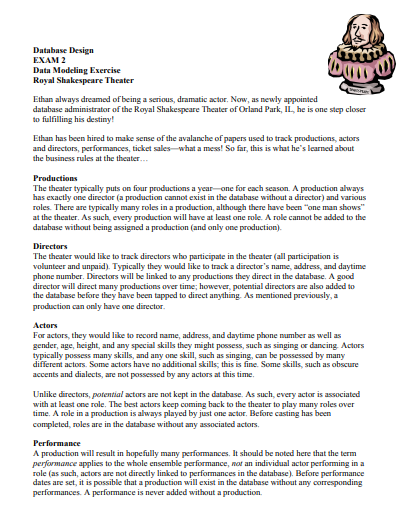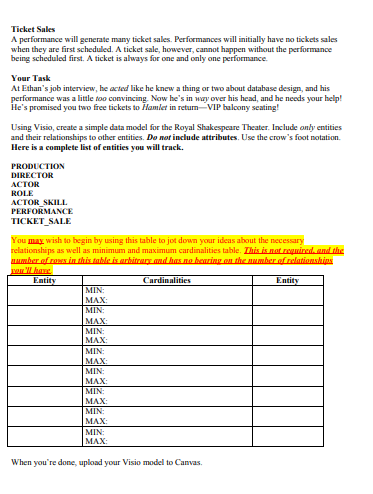Database Design EXAM 2 Dain Modeling Exercise Royal Shakespeare Theater Ethan always dreamed of being a serious, dramatic actor. Now, as newly appointed database administrator of the Royal Shakespeare Theater of Orland Park, IL, he is one step closer to fulfilling his destiny! Ethan has been hired to make sense of the avalanche of papers used to track productions, actors and directors, performances, ticket sales-what a mess! So far, this is what he's learned about the business rules at the theater... Productions The theater typically puts on four productions a year-one for each season. A production always has exactly one director (a production cannot exist in the database without a director) and various roles. There are typically many roles in a production, although there have been "one man shows" at the theater. As such, every production will have at least one role. A role cannot be added to the database without being assigned a production (and only one production). Directors The theater would like to track directors who participate in the theater (all participation is volunteer and unpaid). Typically they would like to track a director's name, address, and daytime phone number. Directors will be linked to any productions they direct in the database. A good director will direct many productions over time; however, potential directors are also added in the database before they have been tapped to direct anything. As mentioned previously, a production can only have one director. Actors For actors, they would like to record name, address, and daytime phone number as well as gender, age, height, and any special skills they might possess, such as singing or dancing. Actors typically possess many skills, and any one skill, such as singing, can be possessed by many different actors. Some actors have no additional skills; this is fine. Some skills, such as obscure accents and dialects, are not possessed by any actors at this time. Unlike directors, porential actors are not kept in the database. As such, every actor is associated with at least one role. The best actors keep coming back to the theater to play many roles over time. A role in a production is always played by just one actor, Before casting has been completed, roles are in the database without any associated actors. Performance A production will result in hopefully many performances. It should be noted here that the term performance applies to the whole ensemble performance, nor an individual actor performing in a role (as such, actors are not directly linked to performances in the database). Before performance dates are set, it is possible that a production will exist in the database without any corresponding performances. A performance is never added without a production.Ticket Sales A performance will generate many ticket sales. Performances will initially have no tickets sales when they are first scheduled. A ticket sale, however, cannot happen without the performance being scheduled first. A ticket is always for one and only one performance. Your Task At Ethan's job interview, he acted like he knew a thing or two about database design, and his performance was a little foo convincing. Now he's in way over his head, and he needs your help! He's promised you two free tickets to Hamler in return-VIP balcony seating! Using Visio, create a simple data model for the Royal Shakespeare Theater. Include only entities and their relationships to other entities. Do nor include attributes. Use the crow's foot notation. Here is a complete list of entities you will track. PRODUCTION DIRECTOR ACTOR ROLE ACTOR SKILL PERFORMANCE TICKET SALE You may wish to begin by using this table to jot down your ideas about the necessary relationships as well as minimum and maximum cardinalities table. This is nor meaningd. and the orme ber of roms in this table is arbitrary ad hes no berries on the ammber of relations Tips Entity Cardinalities Entity MIN: MAX MIN: MAX: MIN: MAX MIN: MAX MIN: MAX: MIN: MAX: MIN: MAX: MIN: MAX: When you're done, upload your Visio model to Canvas








